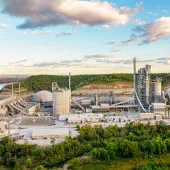New UK levy to level carbon pricing
UK to implement new carbon border adjustment mechanism by 2027 to support decarbonization drive
GOODS imported into the UK from countries with a lower or no carbon price will have to pay a levy by 2027, ensuring that products from overseas face a comparable carbon price to those produced in the UK.
The carbon border adjustment mechanism (CBAM) will ensure highly traded, carbon-intensive products from overseas, including cement, face a comparable carbon price to those produced in the UK.
The new rules will tackle ‘carbon leakage’, reducing the risk of production and associated emissions being displaced to other countries because they have a lower or no carbon price.
The charge applied by the CBAM will depend on the amount of carbon emitted in the production of the imported good, and the gap between the carbon price applied in the country of origin – if any – and the carbon price faced by UK producers.
The Government says taking this action will ensure the environmental integrity of the UK’s decarbonization policies and will give industry the confidence to continue to invest in decarbonization, with the knowledge that it will result in a true net reduction in global emissions.
Chancellor of the Exchequer Jeremy Hunt said: ‘This levy will make sure carbon-intensive products from overseas face a comparable carbon price to those produced in the UK, so that our decarbonization efforts translate into reductions in global emissions.
‘This should give UK industry the confidence to invest in decarbonization as the world transitions to net zero.’
News of the CBAM was announced yesterday (18 December) as the Government published its response to a consultation on a range of domestic carbon leakage mitigation measures, which found 85% of respondents – including the Mineral Products Association – said that carbon leakage is a current or future risk to their decarbonization efforts.
This is because not all jurisdictions are moving at the same pace with the risk that UK emissions reductions do not translate into global emissions reductions, but rather that UK emissions get displaced to other less climate-ambitious countries. The action announced yesterday will help address that risk.
The design and delivery of the CBAM will be subject to further consultation in 2024. The Government will also engage with trade partners, including developing countries, and affected businesses and organizations, to minimize the impact on trade and the necessary compliance steps.
Alongside a CBAM, the Government has also announced its intention to work with industry to establish voluntary product standards that businesses could choose to adopt to help promote their low-carbon products to customers; and to develop a framework which measures the carbon content of goods, that could support other decarbonization policies in future.
In addition, stakeholders have been invited to offer their views on proposed changes to the UK Emissions Trading Scheme, that will ensure it continues to support the UK’s progress to net zero.
A CBAM will work alongside the UK Emissions Trading Scheme to mitigate the risk of carbon leakage. The ETS Authority is consulting on how to better target free allocations of carbon allowances for industries most at risk of carbon leakage, under the ETS. The Authority will also review whether free allocation should be adjusted to reflect any changes to carbon leakage risk for given sectors.
It is also setting out plans to ensure the ETS market continues to offer an effective financial incentive that drives its participants to decarbonize, following a call for evidence last year, with industries being asked for their view on a range of potential measures – including on the design of a new Supply Adjustment Mechanism.
The Government says it remains committed to supporting industry to decarbonize, including with the Industrial Energy Transformation Fund, the Net Zero Innovation Portfolio, and £20 billion investment in development of carbon capture and storage.










